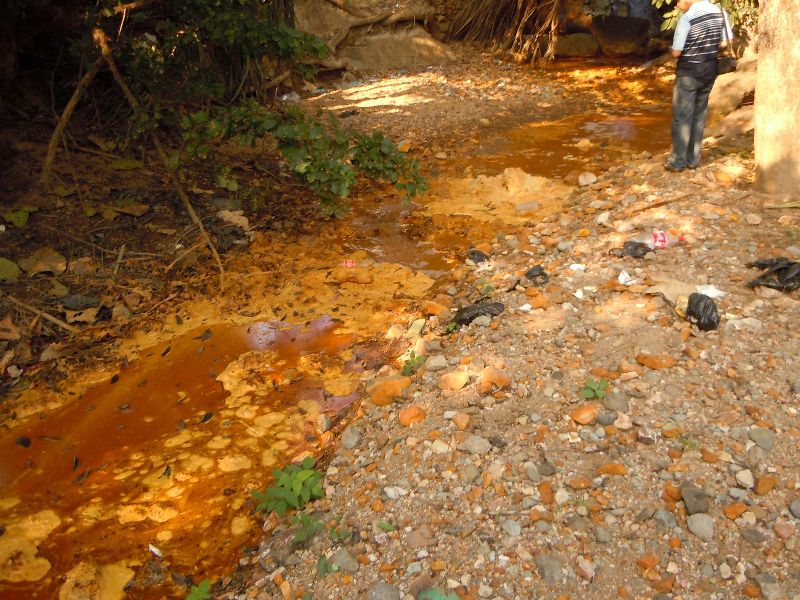Concerned Citizens from Across the U.S. Call on a Milwaukee Company to Act Ethically
A Milwaukee Company’s Toxic Legacy
In 2006, the Salvadoran government decided to revoke the failed Milwaukee-based mining corporation Commerce Group’s mining permits following evidence that the mining project had contaminated local water with highly toxic metals. After decades of gold mining, the Commerce Group mine site has been called an “environmental nightmare.”
In 2012, the Salvadoran Ministry of the Environment (MARN in Spanish) found that the river flowing by the Commerce Group mine site has nine times the healthy limit of cyanide and one thousand times the Salvadoran standard for lead in water for human consumption. Local residents are forced to buy water and collect rain water in order to meet their basic needs, and there reports that show severe health problems in the community resulting from exposure to heavy metals.
Recently, Jim Kuipers, an engineer who consulted for Commerce Group in El Salvador in the 1990’s, released a shocking statement claiming Commerce Group bribed local officials in order to get around environmental regulations. Also, in October, the MARN announced it is beginning to investigate the sources of contamination in San Sebastian. According an article published in the Salvadoran press, the Vice-Minister for the MARN said the mining operations carried out by Commerce Group will be subject to investigation.
In 2009, the Commerce Group, filed a $100 million lawsuit in retaliation against the government of El Salvador under the foreign investor “protections” contained in the Central America Free Trade Agreement (CAFTA). The Commerce Group demanded payment not only for its investments, but also the right to reopen the mine against the government’s wishes. On March 14, 2011, Commerce Group lost their case. However, the government was still forced to pay $800,000 to cover the tribunal’s costs in addition to their own legal fees.
Unsatisfied with the decision, Commerce Group filed for an annulment of the decision, but later claimed they had difficulty paying the $150,000 in tribunal fees. It seemed the case would be thrown out due to lack of payment, but on the final day before their case was closed, the company scrapped the fee together. The annulment hearing is expected for sometime in January.
In a recent tour to the United States members of the National Roundtable against Metallic Mining and Caritas talked about the effects of mining and the Commerce Group’s actions in Cleveland, St. Louis, Milwaukee, Madison, Eau Claire, Chicago, Washington D.C. and Georgia. They also circulated a petition (below) that is being promoted by faith-based organizations from across the U.S. that asks the Commerce Group to drop its multi-million dollar suit and take the steps necessary for environmental cleanup in the community of San Sebastian. A Spanish version of the letter is here.

For all people of faith, our primary commitment is to love one another as God loves us. That principle applies to our business dealings, as thoroughly as to other aspects in our lives. In other words: There is no sphere of life excluded from moral scrutiny and the economic sphere is no exception.
We, the undersigned people of faith, implore the Milwaukee-based Commerce Group to weigh the ethical and environmental consequences of pursuing further mining in San Sebastian, El Salvador, to take responsibility for the environmental contamination and to drop its case in the International Centre for the Settlement of Investment Disputes against the Salvadoran government under the Central American Free Trade Agreement (CAFTA).
Trade itself may violate the dignity of others, or, it may protect the dignity of all human beings, thus becoming an “instrument for good,” as Norwegian theologian Atle Sommerfeldt teaches. It may generate wealth for a few, or, create responsible work for many while still protecting the earth.
We urge you to do the latter.
More than a hundred years of mining at the San Sebastian gold mine in El Salvador reportedly resulted in severe environmental contamination and public health problems in the surrounding community and in nearby watersheds. In 2012, confirming investigations and complaints made by civil society, the Salvadoran Ministry of the Environment found that the San Sebastian River had nine times the acceptable limit of cyanide and one thousand times the compulsory standard for water for human consumption of iron. Local environmental organizations attribute this contamination to acid mine drainage leeching from mining waste and it is currently under investigation by the Salvadoran government.
As a result of two separate environmental audits, the Salvadoran government revoked the Commerce Group’s mining permit on Sept. 13, 2006. Now, taking advantage of “foreign investor protections” in CAFTA, the U.S. company Commerce Group is suing the Salvadoran government for $100 million. The tribunal hearing the case ruled in favor of the Salvadoran government in March, 2011, yet Commerce Group has filed for an annulment of that decision.
Communities of faith are deeply concerned about the impact of metallic mining on public health and on the environment, as well as on the escalating number of transnational corporations turning to international arbitration tribunals to resolve disputes over resource rights.
In 2007, the Episcopal Conference of El Salvador stated that “[…] we affirm that, by putting human life in danger, even though there might be economic benefits, precious metal mining should not be allowed in El Salvador. There are no material benefits that may be bought with the value of a human life.” Further, Roman Catholic and Lutheran churches, as well as faith-based organizations, in El Salvador recently issued a statement saying that the “voracity of national and transnational corporations in order to establish environmentally devastating projects, makes us extremely vulnerable to Climate Change.”
The signatures below call on the Commerce Group to take immediate steps to rectify the existing contamination in San Sebastian and to drop its case against the Salvadoran government. Decisions made to increase short-term profits will have long-term consequences for the lives of very vulnerable people.
Signed,
